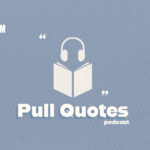[Intro music plays, fades as Silas starts talking]
Silas Le Blanc: In August of 2022, the Toronto Star was embroiled in controversy. Over the popular advice column “Ask Ellie.” Ellie Tesher, a relationship columnist at the Star for over 20 years, was being dragged on social media for advice she gave to a woman experiencing abuse. The woman claimed that her partner had repeatedly told her that he wanted to kill her and pointed a gun at her on multiple occasions. In response, Tesher said “your own careless cheating throughout what you call a relationship, was deplorable and led to this frightening situation.” Some claimed that the incident was part of a pattern, bringing up old columns from Tesher, which they also saw as having similar problematic elements. Historically, many advice columns have treated systemic problems as individual failures. They were often directed to an audience of women, but they were anything but feminist. Many of them would teach women how to conform to traditional gender roles, and fit into a society that didn’t see women as equals.
Tara De Boer: However, in recent years, many advice columns have become a space for people to challenge traditional gender roles and other systemic injustices. In her piece for the review of journalism, production editor Maddy Mahoney writes about the changing landscape of this journalistic medium, and how advice columnists are trying to move away from seeing themselves as authoritative figures. Silas sat down with Maddy to discuss her story, and her thoughts on vice columns, more broadly.
SL: Welcome back to the sixth season of pull quotes. We’re your hosts, Silas LeBlanc, Tara De Boer and Timothy Cooke.
[Pull Quotes theme plays]
SL: Hi, Maddy.
Maddy Mahoney: Hi Silas, how’s it going?
SL: Good. How are you?
MM: Not bad.
SL: Before we start talking about your story, can you just like tell me a little bit about yourself? What is your journey in journalism been so far? You know, what kind of stuff are you usually interested in writing about? Where can our listeners find your work?
MM: Yeah, totally. My journey in journalism so far. I come from an arts journalism background. I originally wrote theatre reviews. That was my first journalism-y gig a long time ago. But yeah, mostly I’m interested in magazines, and like print journalism, and also audio and podcasts these days. I write freelance for Xtra and Toronto Life. And I’m doing a piece for THIS magazine. So I’m a little all over the place, and then I do freelance fact-checking as well.
SL: Yeah, can you give a just a brief summary of what your piece in the review is about?
MM: Totally. So, I took a look at advice columns, and basically the way they’ve kind of evolved over time and what advice columns in Canada these days look like. And it ended up being about the way that traditionally, advice columns have kind of pushed ideas of gender in a sort of progressive way, but also like upheld certain normative ideas about gender and how more recently, a few Canadian advice columns are kind of finally pushing themselves to that place where they can be like really critical of like gender roles and kind of normative ideas.
SL: What made you want to write you know, about this topic initially, you know, were you a fan of advice columns, you know, before researching the story, and if so, which ones did you read regularly?
MM: Yeah, I love advice columns. I think they’re so weird and funny. And yeah, people are super weird. And advice columns are a good place to realize that people are super weird. I read the advice column at Xtra by Kai Cheng Thom for a long time, and I really love that one.
[Clip of Cheng Thom plays]
Hi, I’m Kai Cheng Thom. And I’m bringing you a super special holiday video in which I combine the soulful stylings of my long form column with the snappy charm of my video series in order…
[Clip fades out]
MM: I also used to read, and still read, the like ‘ask a manager, ask a boss’ columns, because people are like, so weird at work and just like do the craziest things and it’s kind of just like, interesting to read about how they handle those situations.
SL: Did you ever take the advice of from an advice column? Did you ever read something and were like, ‘huh, like that might apply to me,’ and kind of changed the way you approached anything?
MM: Oooh, interesting. That’s a good question. I can’t think of one specific one. I will say the Xtra advice column. A lot of it’s about like sex and dating, like that sort of thing. And kind of an underlying theme is just like, ask people the questions you want to ask them instead of like kind of hyping yourself up about it or getting too stressed. So I think that I’ve definitely, like, thought more about that since reading that column and tend to just kind of like, try and be upfront about things like that.
SL: Have you ever written in to an advice column?
MM: No, I wish. Sometimes I think about it. And I just like haven’t quite gotten to the point of like, sitting down and writing the email, because now I’m familiar with so many columnists. I’m like, maybe I would like to know what they think about this problem that I’m having. So, coming up.
SL: Yeah, just moving on to your actual story. You know, what were the main challenges that you ran into while writing the story? Was there any kind of roadblocks you experienced? Anything like that?
MM: Yeah, I mean, advice columns, I think in general arts and like lifestyle journalism doesn’t get the kind of like attention that what people consider to be like more serious quote unquote journalism gets, so there’s not a lot of like prior work about advice columns. That was definitely a difficult thing, kind of like taking the few things that there are and trying to get like a good lay of the land just in terms of like, what’s going on there. Getting in touch with the columnists themselves was pretty easy, which was nice, but it did take a while to kind of get to that place of like having enough research and like analysis to be like, ‘Okay, I am seeing that there is a change happening here.’ Like I think honestly, that happened like almost towards the end of writing it where we were like, ‘okay, shit, thank God we found something.’
SL: Yeah, I guess like who were the main people you reached out to and then who are your kind of like, favourite characters when researching for this story?
MM: Well, two of the people who end up playing the biggest part in it are Marlowe Granados, who has a column at the Baffler, which is an American magazine, but she lives in Toronto and Kai Cheng Thom at Xtra, who actually I was not able to get in touch with, but because they have so much like published work there, they were able to be a big piece of it. And then I would say Ellie Tesher at the Toronto Star was another big source that I was able to talk with, which was nice. I mean, I think Marlowe is really interesting. She’s very, she has that kind of like scattered like hectic columnist kind of mindset, like that very, like disorganized artsy vibe, but she’s also very, like, smart and like intuitive. She was like a fun person to talk to and just like hear about her apartment and how she writes, which is like, very chaotic and interesting. And I was like Ellie Tesher was also an interesting person to talk to you. Her columns are a bit more controversial.
[Clip of Tesher plays]Well, Tracy, it does take a couple of cool calculating jugglers to have both of you believing that cheating can be an honest relationship,
[Clip fades out]MM: often for good reason. But I did not know how like much about her career and kind of life before some of her more recent columns. And yeah, I was surprised at how much I enjoyed talking with her.
SL: I noticed kind of when you talk to Marlowe, you just mentioned that you’re interested in hearing like kind of about her apartment about how like scatterbrained she was, like I think you’d like painted a really good picture in your opening, or like in your lead. Did you like go to her apartment? Since you kind of do get a lot of like details? Like what kind of like questions did you ask to get that kind of information out of her?
MM: We ended up talking twice. So the first time I talked with her, she like kind of mentioned, where she writes the column and didn’t originally give so much detail about it. She was like, ‘Oh, you have like a little desk kind of like shoved in the corner of my apartment and my three cats and like two dogs run around. And it’s like my laptop is propped up on books.’ And I guess like one of the things that the piece is looking at was kind of how modern advice columnist or like contemporary advice columnists are embracing, like, chaos. They’re not like pretending to be like perfect or have all the answers. They’re like, “I have problems and so I’m, like, qualified to address other people’s problems.” And I thought that was such a good like illustration of that. So, I asked her–I didn’t end up going–I asked her lots of questions about it. And then I called her back, and I asked her more questions about it. And she was pretty game. She’s like a writer as well so I think she didn’t think it was super weird for me to be like, “What colour is like the orchid on your desk?” So, she was a good sport about it and we kind of got there that way.
SL: So, I was kind of interested while reading your piece, about–and you mentioned this a bit before–but about the gendered aspect of the story while reading it. You talked about kind of on one hand, historically, a lot of these advice columns, were kind of a space for women in a predominantly male media environment. Yet at the same time, you know, a lot of the advice given is stuff that we would consider now–and probably even back then–like very anti-feminist. Can you talk a little bit about what went into researching the history advice columns? As well as, you know, how this history translated into what we kind of see from advice columns today?
MM: Yeah, I mean, I think the history of it is like so interesting. And advice columns now are still really big and tons of people read them, but like in the 60s and 70s, like so many people read advice columns, like I think Ann Landers was like 1978’s, most influential person in the world or something like
[Clip of Landers Plays]
I might make a speaking tour. There’s somebody there one, two, three, five, people will come up to me and they’ll put my hand in theirs and they’ll say “you know, I wrote to you four years ago and boy, you saved my life,” or some youngster will come up and say, “you know, you’re like a mother to me.” And I hear this phrase very often, and
[Landers clip fades out]
MM: So many people read them. And I think they were at that point really about kind of like classic ‘Miss Manners’ style thing, like they were really about, like, acting normal and like acting properly, as opposed to kind of like solving your problems. They were kind of like, ‘don’t be weird.’ And so yeah, there’s a couple. Again, there’s not a ton of research sources, but there’s a couple of really amazing books. Jessica Weisberg’s book, Asking for a Friend, is really good and is like an amazing resource for the history of advice columns, but I think, yeah, it was a cool piece in that like, looking back at that history was kind of a necessary part of realizing that there has been a change, because it’s not something that I knew when I started researching the piece. I was just like, “wow advice columns are so like, funny and interesting and nobody ever looks into this.” So yeah, the history was a big part of it. Because it was like, okay, they really have gone in a different direction than they originally went. And like, what’s happening with that, you know?
SL: What do you think kind of like triggered this change in the way advice columns kind of operate now?
MM: Yeah, I mean, I think it’s partially the kind of people writing them. At that point, it was, tended to be, like married, middle upper-class, like affluent, white women writing them. And like, those are people who are able to, like, integrate into society maybe more easily, or like, don’t have to be as radical to like, get the things that they want out of society in terms of like gender and things like that. And what’s cool now is like Kai Cheng Thom is like a trans woman writer, and she’s also not white. And Marlowe Granados is also not white. And I think having people come in with those kind of perspectives, just like challenges everything a bit more, because you’re like, ‘Okay, I’m not allowed to just kind of go with the system we have now. So, like, why should we even have it?’ I think that’s a big part of it. And I think too, just like changing and evolving ideas about gender, and like, realizing that the gender binary is fake, and like all of those things. I think it’s kind of like advice columns do influence the way that people think about gender, but also the way that we think about gender like influences advice columns. And so, like the interplay of those things, it does kind of slowly get pushed forward.
SL: What is it about the advice column format, specifically, that made it as you pointed out, historically, kind of a space for individual change, but not like broader systemic change? As well as like, you know, is there any kind of examples of that that you found in your reporting?
MM: Yeah, I mean, it’s kind of like the way that advice columns are because it is like a specific person’s problem. It’s like easy to address that problem without addressing kind of the context. So, like, advice columns, were fairly progressive, in terms of like, queer issues for the time, but in like the 70s, or 80s, people would write into advice columns, and be like, oh, you know, my kid is gay. And I’m, like, upset about it. And like the advice, columnists would write back and be like, well, you know, like, it’s your kid and like, you should love them and they’re just trying to live their life or whatever. Like, some of the answers were, like, not horrible. They were like, decent, but because they can just address them as a like, interpersonal issue, they’re not like, well, why does it freak you out that your child is gay? Or like, well, why do you have this automatic reaction of like, fear towards that? Whereas I think now, advice columnists kind of do take aim at those broader things where they’re like, okay, well, why do we think this? Why is your this your first reaction? What can we do to kind of change this on a bigger scale than just like, your relationship with your child? You know?
SL: This kind of gets into something else I wanted to ask you about is, you know, you kind of use that example. But you also talked about in your article like, Kai Cheng Thom specifically would kind of like challenge people’s notions of like gender and sexuality. Like, what kind of advice would she gave her like, a similar kind of like problem like that?
MM: Yeah, I mean, I think what Kai Cheng Thom is really good at, is she does give people like concrete advice in terms of like, okay, well, what should I do? Like she does offer things like that, which I think is like, consistent with what advice cons have always done, but I think she also kind of calls on people to do a lot of like, reflection beyond that. So it’s not just like, “Okay, you should act this way.” But be like, “Okay, you should think about why you have this feeling. And like, the reasons why you feel this way are going to inform what you should do about it.” And like, pushes people to look outside of their own perspective. And also, like, look at the way that they are influenced by, like, broader social factors or by the way, like at the way that the people they’re interacting with are influenced by those sorts of things. And yeah, I don’t know. I think she’s just really good at being like, okay, yes, like, you feel this way, but also, like, nobody should feel this way because this is wrong, or just wrong, like factually wrong, like incorrect. So, yeah, I think she’s good at that.
SL: You talked a bit about how, you know, many advice columnists nowadays are kind of rejecting the idea of themselves kind of having any sort of authority over, over really just anyone else. And they don’t really see themselves as like more qualified to give advice than anyone else. How do you think this kind of like reflects in their work? And how does it kind of impact the way that they really like offer advice to people?
MM: Yeah, well, I think like, again, back in the day, there was kind of this like, idea of advice columnists, where it’s like, “okay, well, I know what how you’re supposed to act.” And there’s a bit of like, I guess like condescension, or like, they’re like, you’re doing it wrong and like, be normal, like, don’t do that. And I think now, because advice columnists are coming from this place where they’re like, “Okay, I am also not perfect, and like, I have complicated relationships, and like, I have done harmful things or, like acted in ways that I don’t feel proud or like, excited about.” It’s kind of a bit more of a like peer to peer relationship, like, yes, this is a person that you’re going to for advice, but it’s also like, people use their own experience fucking up, basically, to give you advice about fucking up, as opposed to being like, “Okay, well, I’m perfect. And so I can give you advice from this place of like, moral authority or perfection,” whereas I feel like it’s a bit more, the playing field is a bit more equal now. And there’s also not this myth that anybody is perfect.
SL: I remember like, when you were first pitching the story, one of I guess, kind of one of the main news hooks that you used was, you know, there’s a controversy around the “Ask Ellie” column, which you wrote about in your piece. And you just like summarize, kind of, what that controversy was.
MM: Yeah, definitely. So there was a column I think, in June, but in the summer of last year, where a reader wrote in and was saying that she was in basically like, a super abusive relationship where she had cheated on her partner. But like, in retaliation, her partner was threatening her, it had gotten really serious and scary, where her partner had held a gun to her head saying that he would shoot it. And she basically asked like, if she was to blame, because she had cheated on her partner. And part of Ellie’s answer was victim-blaming in that she was like, ‘your behaviour and like your disrespect of your partner put you in this dangerous situation where he’s now like holding a gun to your head.’ And like, obviously, we don’t blame people for their own abuse in that way. Like, it’s only the fault of the person holding the gun. But yeah, a lot of people flagged that. And were really outraged–I think, rightly–by the fact that that made it into the paper. And then the Star’s editors ended up putting an Op Ed at about it, just saying that, not that they missed it, but basically, like they didn’t want to tread on Ellie’s authority by asking her to change it. And that’s kind of why it stayed in the paper.
SL: What’s something that you know, as someone who’s kind of following this news who might have like, read her column, or like the controversy about it on Twitter? What’s something that they might have, like missed, that you kind of found in your reporting about that controversy?
MM: Yeah, I mean, I think even after reporting it, my thoughts about the actual column itself has not changed, like the original way that that column was written was inappropriate. But I mean, it was interesting talking to her, which I only realized after talking to her, I was like, I don’t know if anybody really like, asked her about this. I found out through talking to her that she had these like, major health problems going on at that time. And like, again, I don’t say that as an excuse for her, like, I don’t think that that column should have been published and either her or the editors at the Star should have caught that. But just, I think, again, like something that maybe could have been solved by taking the approach that other columnists are taking, where it’s just like, you’re not trying to always be perfect, you’re like “today, I can’t write this column, because I’m too sketched out about my, like, serious heart condition that I’m having.” And so maybe, then you just, like, sit one out, like, I think the pressure to have that old-school facade of like, “I am always able to give advice. I am like, always in a place to do this.” Like I think in some ways, that is where that issue came from. And so that was kind of an interesting aspect of it that I don’t think kind of came out when that news broke in the first place.
SL: So, just like last question, you ended the article by saying advice columns no longer instruct readers on how to survive oppressive systems. They give us permission to burn them to the ground. You know, we kind of talked about a lot of examples, you know, throughout this conversation, but what did you kind of find that you think has contributed to this sort of change?
MM: I mean, I think just the fact that advice columnists are starting to like place people’s individual problems within these bigger issues, these kind of like societal beliefs around like gender and relationships and those sorts of things. When you start to like locate those systems as the problem, then of course, you start to be like, ‘Okay, well, if this system is a problem, then we should change it,’ as opposed to before when you’re kind of like, ‘okay, well, this person is the problem so we should change you.’ Individual people in advice column, sometimes are problems but like, often they’re kind of like being influenced by these bigger systems. And so I think just even starting to recognise that that’s where a lot of this behaviour is. coming from or being influenced by, naturally kind of leads to being like, ‘oh, okay, well then this is the thing that needs to change.’
SL: Okay, thank you.
MM: Yeah, thanks Silas!
SL: Thanks for joining us for this episode of Pull Quotes. Where are your hosts, Silas LeBlanc, Tara De Boer and Tim Cooke. Big thanks to our producer Angela Glover, executive producer, Sonya Fattah and our fact-checker, Stephanie Davoli. We’ll see you next time.










